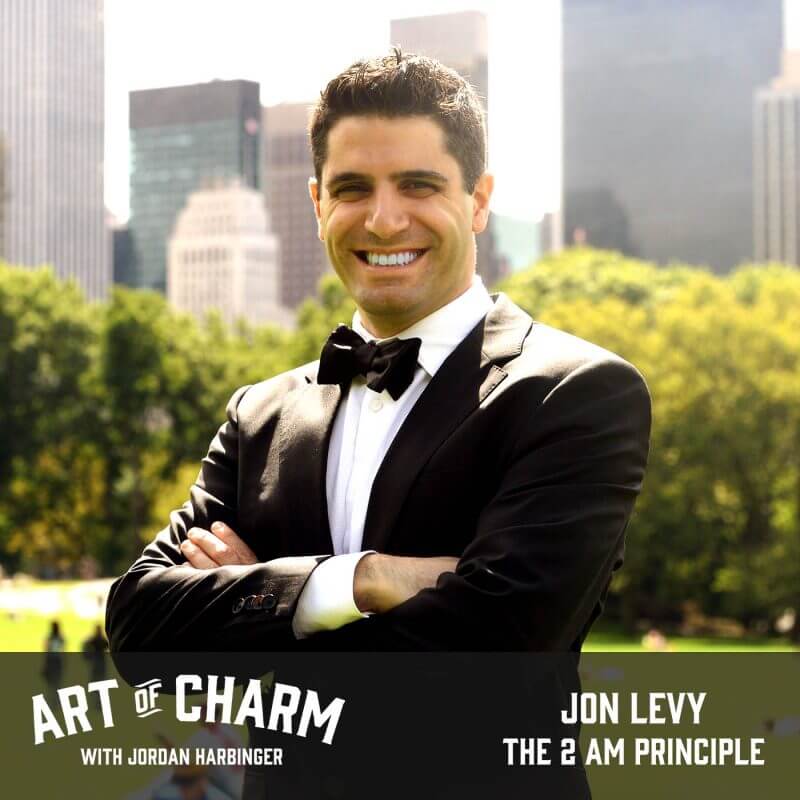Jon Levy (@JonLevyTLB) is a behavior scientist who studies influence and adventure. He returns to the show to talk about his latest book, The 2 AM Principle: Discover The Science of Adventure.
The Cheat Sheet:
- What is adventure and why should we seek it out?
- Learn the four stages of any adventure.
- What it takes to filter the right people into your circle.
- How to politely cut ties with the wrong people.
- Breaking self-imposed limitations in our lives.
- And so much more…
[aoc-subscribe]
Webster defines adventure as “an undertaking usually involving danger and unknown risks.” Depending on who you are, this is either something you eagerly seek out or try to avoid. But is adventure a matter of serendipitous chance, or is it a calculated endeavor?
In this episode of The Art of Charm, behavior scientist Jon Levy rejoins the show (check out his first appearance here) to unlock this riddle and discuss his new book, The 2 AM Principle: Discover The Science of Adventure. Grab your Indiana Jones gear and enjoy!
More About This Show
“If the most exciting and thrilling moments of your life really happened by pure serendipity and nothing else, then all of us would live similarly exciting lives,” says Jon Levy, author of The 2 AM Principle: Discover The Science of Adventure. “The fact is that we all know people who live wonderfully quiet lives, and we know people who live really exciting, thrilling lives. Which means that the people living exciting lives are probably doing certain things or embodying certain characteristics that the rest of us aren’t.”
Jon was determined to figure out what underlying principles govern the onset of adventure in order to live a more exciting, thrilling life on demand. On the obverse of this, such knowledge would also allow someone who eschews adventure to stay out of its way — so there’s really something here for everyone.
Jon concedes that every human being has a different tolerance for novelty and excitement. Someone afraid of heights won’t be too thrilled at the idea of having to climb five stories down a fire escape in an emergency, but then you have people who fearlessly base jump from tall buildings on a regular basis. It’s also quite possible that the person who’s afraid of heights loves wreck diving, while a base jumper might be afraid to go near the water — so adventure means different things to different people.

We already mentioned what Webster had to say about adventure above, but Jon has devised his own definition. To him, something is an adventure if it:
- is exciting and remarkable. “Remarkable means it’s worth talking about,” says Jon.
- possesses adversity and/or risk. “You can experience a lot of perceived risks without being in any direct danger,” says Jon. He compares skydiving — “which is scary but incredibly safe” — with wrestling an alligator — “which is scary and insanely stupid and dangerous!”
- brings about growth. “The person you are at the end is different than the person you are at the beginning.”
Adventure is the basis for every story in history, from The Odyssey to The Hangover. It presents conflicts to overcome. It gives us context for the stories we pass down through generations. “It’s the way we see the narrative of our life,” says Jon. And taking a cue from Flow author Mihaly Csikszentmihalyi (an adventure to pronounce for some of us), Jon notes that you “are in a peak optimal performance state when you are doing something just outside of your skillset.”
So adventure is more than just grist for future storytelling — it’s a way to learn optimally. And like anything that promotes self-improvement, it’s not always a comfortable process. “We need to be willing to grow,” says Jon. “We need to be willing to be uncomfortable.”
Listen to this episode of The Art of Charm to learn more about the cultural significance of adventure, the four stages to every adventure that — when applied — make life exciting, why our brains operate differently in new environments, how travel triggers a desire to explore and try new things we’d often never chance in familiar surroundings, how Jon found adventure on the empty streets of Nice in the middle of the night, what the impact of constraints can have on the quality of our experience, why the company you choose when traveling can make all the difference between adventure and annoyance, what really happens after 2 a.m., and lots more.
THANKS, JON LEVY!
If you enjoyed this session with Jon Levy, let him know by clicking on the link below and sending him a quick shout out at Twitter:
Click here to thank Jon Levy at Twitter!
Resources from this episode:
- The 2 AM Principle: Discover The Science of Adventure by Jon Levy
- AoC Episode 351 with Jon Levy: The Influencers Dinner
- Jon Levy’s website
- Jon Levy at Twitter
- Jon Levy at Instagram
- The Hangover
- Flow: The Psychology of Optimal Experience by Mihaly Csikszentmihalyi
- Steven Kotler | The Rise of Superman (Episode #271)
- The Paradox of Choice: Why More Is Less by Barry Schwartz
- Ghost Tower: Climbing Bangkok’s Abandoned Skyscraper by Matthew Karsten, Expert Vagabond (website with plenty of pictures that’ll make your toes curl)
- Thinking, Fast and Slow by Daniel Kahneman
You’ll also like:
- The Art of Charm Challenge (click here or text 38470 in the US)
- The Art of Charm Bootcamps
- Best of The Art of Charm Podcast
- The Art of Charm Toolbox
- The Art of Charm Toolbox for Women
- Find out more about the team who makes The Art of Charm podcast here!
On your phone? Click here to write us a well-deserved iTunes review and help us outrank the riffraff!
